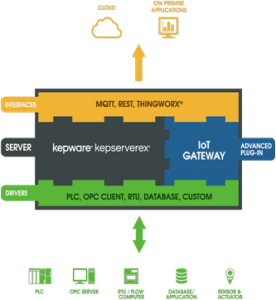
You can see that the payload is now much cleaner and closer to the required format. "|TAGNAME|_t": |TIMESTAMP| |#unless the Client Format, swap to Wide: Under Message, select the Advanced template To do so, double click the Agent created: The message format required from IBM are: Once connected, you can validate that the data is sent to the broker and can be used for dashboarding or other services. In this example, we are going to select the _time_second tag and add it to the agent: For example: Ĭlick Finish to complete the Agent Configuration Add a Tag from Kepware by clicking Add IoT Item
#Kepware advanced tags password#
Password: The password is the authentication token specified in the device information. Username: The fixed string “use-token-auth” is used as username to indicate that a token is being used. The MQTT client ID is in the format d:orgId:deviceType:deviceId. Click Next to reach the next configuration page The value can be any string that is valid in MQTT.Īs such, the format we will use is iot-2/evt/ event/fmt/ jsonģ. Common content type values include but are not limited to “json”, “xml”, “txt”, and “csv”.
#Kepware advanced tags how to#

When receiving these event messages, the subscribing application can either use a wildcard to receive events with any ID or subscribe with an event_id that matches the event_id that the publisher used. The event ID can be any string that is valid in MQTT.

Step 1 : Configuration of IBM Watson’s IOT Platform This guide assumes:įamiliarity with KEPServerEX’s OPC UA Server Configuration as well as the concepts in operating KEPServerEX. Thanks, and look forward to hearing from you.In this post, I will documenting on the process for sending data to IBM Watson Cloud Platform.

#Kepware advanced tags driver#
In other words, what you're looking to do - if I've understood correctly - is possible but it will take a combination of particular configuration of the ODBC Client driver and the use of QuoteAdvanced Tags. It might best to discuss this via phone and/or remote support session this is heavier engineering work that often requires engagement with my team. Here are a couple of webinars where I provide a detailed overview and example of functionality similar to what you're looking for: > you might need to use our Advanced Tags plugin in order to automatically place values in Input variables and have the procedure automatically executed. > you would use Output variables to combine / create the response value(s) that you're looking for the Return variables (as you might know) are just for success or failure decimal values.

> you would create an Input variable in your Stored Procedure to retrieve an ID field NOTE that you can create up to 256 parallel Queries within a single instance of KEPServerEX, and we can support many hundreds more queries if you don't mind then run sequentially.Ģ- Switch to using a Stored Procedure access method, and you can do the following: As an aside, I have pushed for this feature quite often but so far we have not had enough external customer interest to add the feature.ġ- Continue to use a Query table access method and hard-code the ID field in each query. Please note that you can reach my team directly by emailing us at regard to your question, unfortunately we cannot use "dynamic" parameters like a tag name variable as "ID" in a Query table access method. Hello! I manage Kepware's Applications Engineering team and would be happy to field this question.


 0 kommentar(er)
0 kommentar(er)
